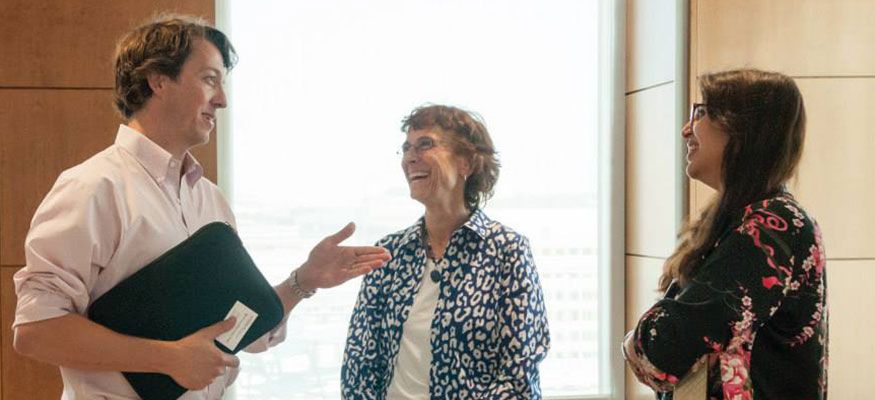
Not long ago, Barbara Colliver found herself struggling with an ethical dilemma at work. Colliver, a chaplain at a medical center in Australia, counsels hospital patients on perinatal and palliative matters. In hopes of resolving the issue, she traveled to GW’s Foggy Bottom campus for the fifth annual Spirituality and Health Summer Institute hosted by the GW Institute for Spirituality and Health (GWish) in July 2013. Colliver recalls one presentation in particular that helped her overcome her struggle. “I actually realized what was going on and what the conflict within me was, and I could come to some peace about that,” says Colliver. “But this year, I had a whole different ethical and practical dilemma.” So she returned to the Foggy Bottom campus for the sixth annual Spirituality and Health Summer Institute, July 23–26.
Established in 2001 as the first university-chartered institute supporting spirituality in health care, GWish hosts an annual Summer Institute. This year’s institute, like prior ones, focused on “whole-person” care, which means integrating spirituality into health care using practical tools and techniques.
“Care has to be about mind, body, spirit,” says Christina Puchalski, M.D. ’94, RESD ’97, professor of medicine at the George Washington University School of Medicine and Health Sciences (SMHS) and the founder and director of GWish.
“Success comes from broadly defining spirituality when it comes to caring for patients,” says Puchalski. “Everybody can have a term for spirituality, but how it manifests itself differs,” she adds. “It’s not just about religion. Religion is a subset of spirituality. Spirituality is about people’s inner resources to help them deal with difficult situations, like diagnoses of cancer or diabetes or arthritis or getting older or helping them experience the joys of childbirth. And for the clinician, awareness of their inner or spiritual life is what gives them ability to practice compassionate presence or listening.”
What’s more, the concept of spirituality differs across countries and cultures. That’s what made this year’s institute different from previous years. Speakers and participants traveled from all over the world to share their innovative ideas and fresh findings. Physicians, chaplains, nurses, social workers, counselors, and researchers from Australia, Brazil, Canada, Scotland, Spain, Switzerland, and the United States joined together to discuss topics such as the role of spirituality in palliative care, the vital part chaplains play in health care, and the importance of teaching medical students, and even seasoned doctors, how to embrace spirituality and compassion in clinics and hospitals.
“What’s so great about the summer institute is that all these disciplines come to the conference to learn together and dialogue about how they can work as a team to meet the spiritual needs of patients,” says Puchalski.
Participants worked with standardized patients to create whole person treatment plans. They also heard presentations from hospitals and clinical sites, including the GW Medical Faculty Associates (MFA) Outpatient Supportive and Palliative Care clinic, where interdisciplinary teams provide whole person care. Sermsak Lolak, M.D., associate professor of psychiatry, and director of inpatient psychiatric consultation-liaison service at the MFA, presented models of teaching compassionate care, highlighting the importance of self-compassion for the clinician particularly as part of self care.
The institute’s international focus highlighted the global movement for integration of spirituality into health systems globally, a movement that inspired the development of a global network in spirituality and health by GWish with collaborators from all over the world. As former Assistant Secretary for Health for the U.S. Department of Health and Human Services Howard Koh noted during the 2013 Summer Institute, a “silent revolution” is occurring to create more holistic and compassionate systems of care.
The interplay of physicians, social workers, nurses, chaplains, and others, even the housekeeping crew, says Puchalski, is critical to patient needs spiritually, as well as physically. Collectively, the medical team must be compassionate and present for a patient, listening hard to what that patient is saying and acting accordingly. “Spiritual care is about being compassionate and that means really being present for another person’s suffering,” she explains.
Working as a team, summer institute participants from across the continuum of care learned to develop a treatment plan tailored to a particular patient. Each member had to carefully consider and assess the patient’s physical, emotional, social, and spiritual needs through thoughtful dialogue with the patient and with each other. For example, GW’s outpatient palliative care team may need a nurse or social worker to conduct a spiritual screening, a doctor to conduct a spiritual history, and a chaplain to conduct full spiritual assessment, which may also include a patient’s family members.
Growing the role of hospital chaplains in that medical team is something Puchalski and the Summer Institute’s Co-Director Rev. George Handzo, BCC, says is vital for integrating spirituality into health care. “For years, there has been an underutilization of chaplains in health care,” says Puchalski. “The thinking was to use them if someone is dying or in a religious situation, but chaplains do so much more and are vital members of clinical teams.”
It’s a subject Ewan Kelly, M.D., Ph.D., knows about, especially in the face of rapid changes in the delivery and economics of Western health care. Kelly began his career as a physician and later became a hospital chaplain and university teacher. He now works with the National Health Services for Scotland on the strategic development of spiritual care. The role spirituality can have in promoting well-being throughout life, not just when illness and crises arise, is crucial, says Kelly. Spirituality, he says, can give our lives meaning and purpose, both keys to wellness because they allow people to “look at the resources that are within us, between us, around us, and beyond us, which keep us well.”
“Loss of meaning and purpose is a huge issue in illness because it not only threatens life, but can also threaten the quality of life,” Kelly explains. “That’s where clinicians and clergy can step in and help people discover, or rediscover, spiritual resources that keep them well.”Likewise, Xavier Gómez-Batiste, M.D, Ph.D., director of the QUALY Observatory, a WHO Collaborating Centre for Public Health Palliative Care Programmes at the Catalan Institute of Oncology, spoke about the importance of spiritual wellness in palliative care, which considers patients’ comfort and their quality of life at any stage of illness, not just at the end. When it comes to palliative care, says Gómez-Batiste, much more focus should be placed on psycho-social or spiritual care through clinical applications and teaching.
But how does one effectively teach medical students, residents, and physicians about spirituality and compassion’s vital role in health care? Speaker William Branch, M.D., professor of medicine at Emory University in Atlanta, has been teaching medical students and residents about spirituality and compassion for 25 years. He favors a technique known as “reflective learning.” That is, students and residents write from the heart about their poignant clinical experiences, share them with their colleagues and mentors, and then reflect on them through face-to-face discussions with their peers. “People can learn things, but unless there is a reflective component, they don’t grow,” says Branch.
For Colliver, this year’s summer institute has given her time to reflect and helped her sort out spiritual and ethical questions concerning perinatal care. “I get to go home again with an answer to the question that I brought this year,” she says.


